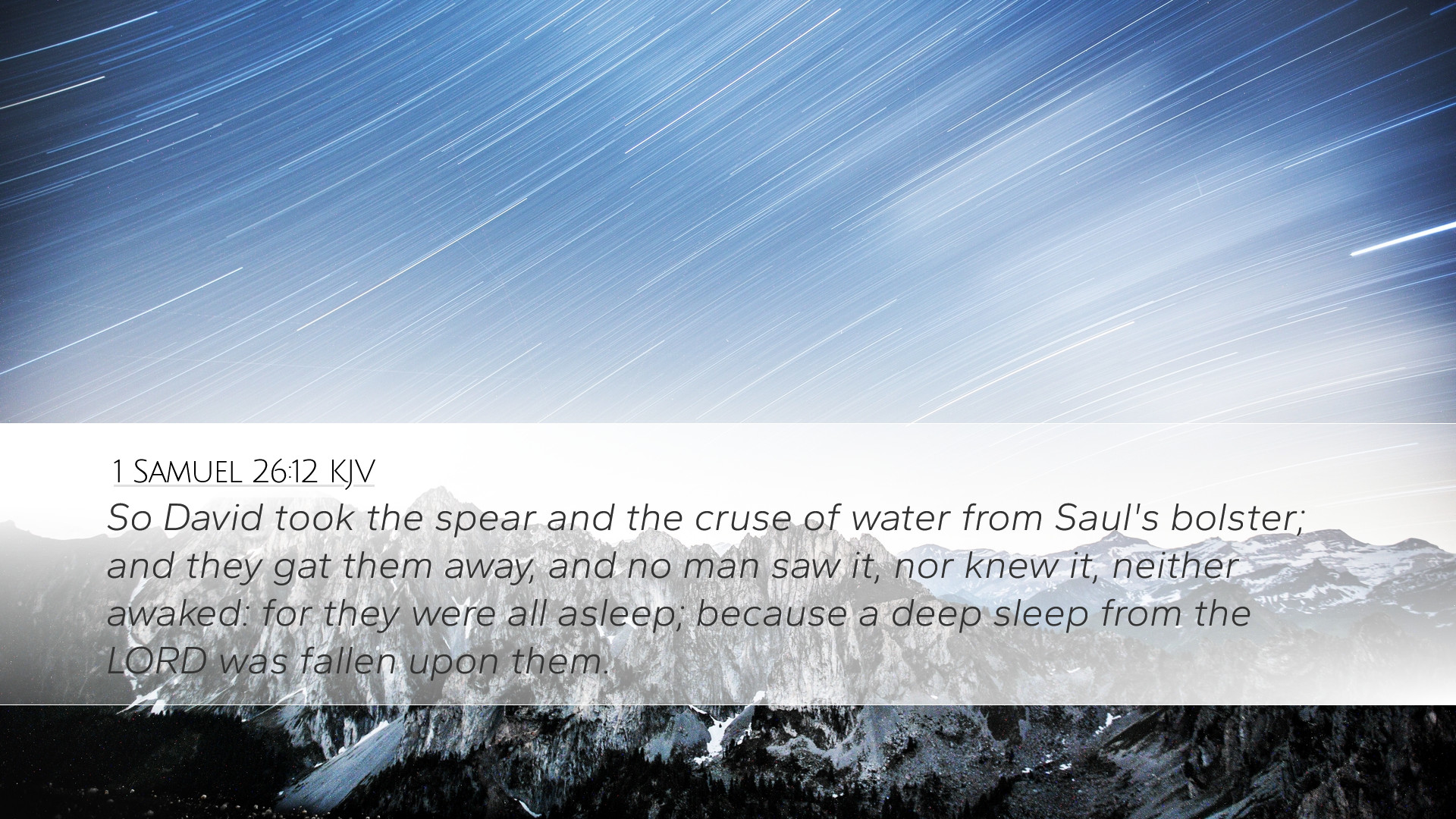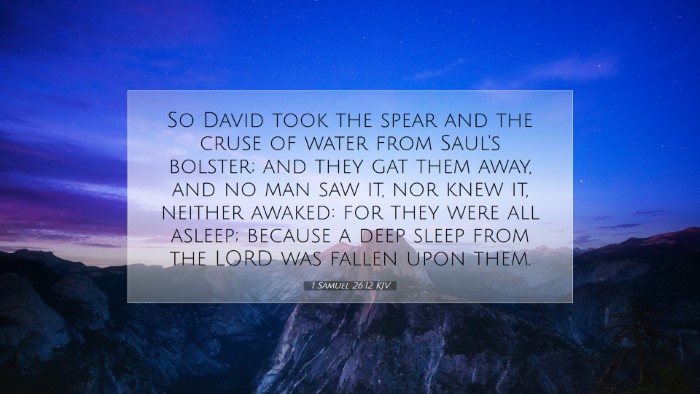Commentary on 1 Samuel 26:12
Verse: "So David took the spear and the cruse of water from Saul's bolster; and they gat them away, and no man saw it, nor knew it, neither awaked: for they were all asleep; because a deep sleep from the Lord was fallen upon them." (1 Samuel 26:12)
Introduction
This passage provides a profound glimpse into the providential hand of God amidst conflict and personal rivalry. As we reflect on this event in the life of David, we observe themes of divine protection, the nature of authority, and the moral dilemmas faced by individuals seeking to navigate a world rife with betrayal and envy. The insight provided by esteemed commentators will enrich our understanding of this text.
Contextual Background
David finds himself in a precarious position, constantly evading King Saul's attempts to kill him. The narrative vividly illustrates a moment where David's men discover Saul's camp and suggest that this is the moment to strike. However, David remembers his respect for God's anointed king, highlighting his moral integrity versus the ease of taking revenge. This incident occurs during a period of intense emotional and spiritual turmoil for both men—highlighting the conflict between divine purpose and human ambition.
Insights from Matthew Henry
Matthew Henry emphasizes the remarkable nature of God's providence in this account. He observes:
- The Divine Sleep: Henry notes that the deep sleep falling upon Saul and his men signifies God's control over circumstances. This event illustrates that God can render the most formidable foes powerless when it suits His divine purposes.
- David's Integrity: He reflects on David's restraint, portraying him as a man of principle who refuses to take vengeance into his own hands. This act of mercy ultimately underscores David’s trust in God’s justice.
- Symbolism of the Spear and Water: Henry suggests that the spear represents authority and ambition, while the cruse of water signifies sustenance and life. David taking both emphasizes his understanding of Saul's kingship while also acknowledging his own needs in the wilderness.
Reflections from Albert Barnes
Albert Barnes dives deep into the implications of David's actions in this passage:
- Operational Discipline: Barnes points out that David's capacity to steal away undetected illustrates significant discipline and skill, which serves as an allegory for spiritual vigilance in the life of believers.
- Moral Authority vs Political Authority: He makes a distinction between moral authority held by an individual of integrity, like David, versus the political power wielded by Saul, which has become corrupted. This dichotomy remains relevant, prompting believers to consider ethics in leadership.
- God’s Sovereignty: Barnes reinforces that the “deep sleep” placed upon Saul was a direct act of divine intervention, which serves as a reminder that God is ultimately sovereign over the affairs of men.
Analysis by Adam Clarke
Adam Clarke's commentary offers detailed insights into the cultural and historical context of this verse:
- Cultural Dynamics: Clarke emphasizes the intense relationship dynamics between David and Saul, which reflects broader themes of the struggle between the righteous and the wicked. The act of taking Saul's spear is symbolic as it represents David's claim to the kingship that Saul unjustly holds.
- Divine Timing: He interprets this event as a demonstration of God's timing and occurrence of justice; while David had the opportunity to kill Saul, he refrains, showcasing his faith that God will deliver him at the right moment.
- Lessons for Leadership: Clarke asserts this encounter teaches valuable lessons regarding the characteristics of a godly leader, emphasizing compassion and self-control even when in a position to retaliate.
Theological Implications
The theological implications of this passage resonate deeply through the ages:
- God’s Providence: This narrative serves as an illustration of how God orchestrates events and provides protection to His chosen ones amid adversity, a theme that can encourage those suffering injustice.
- Right Response to Conflict: David's decision not to harm Saul conveys a powerful message about the appropriate responses to conflict, urging believers to exercise patience and trust in God's overarching plan.
- Foreshadowing of Christ: The account of David and Saul is often seen as a precursor to the greater narrative of Jesus Christ, who, despite having the power to destroy His enemies, chose to extend grace and mercy instead.
Concluding Thoughts
1 Samuel 26:12 is not merely an account of a nighttime raid; it serves as a rich tapestry woven with themes of divine sovereignty, moral integrity, and the challenges of leadership. Through the insights of Matthew Henry, Albert Barnes, and Adam Clarke, we are reminded of the importance of faithfulness in our actions, the need for moral courage, and the assurance that God’s plans will ultimately prevail. For pastors, scholars, and students of the Bible, this passage encourages deep reflection on how we navigate our own struggles while honoring God's purpose in our lives.


